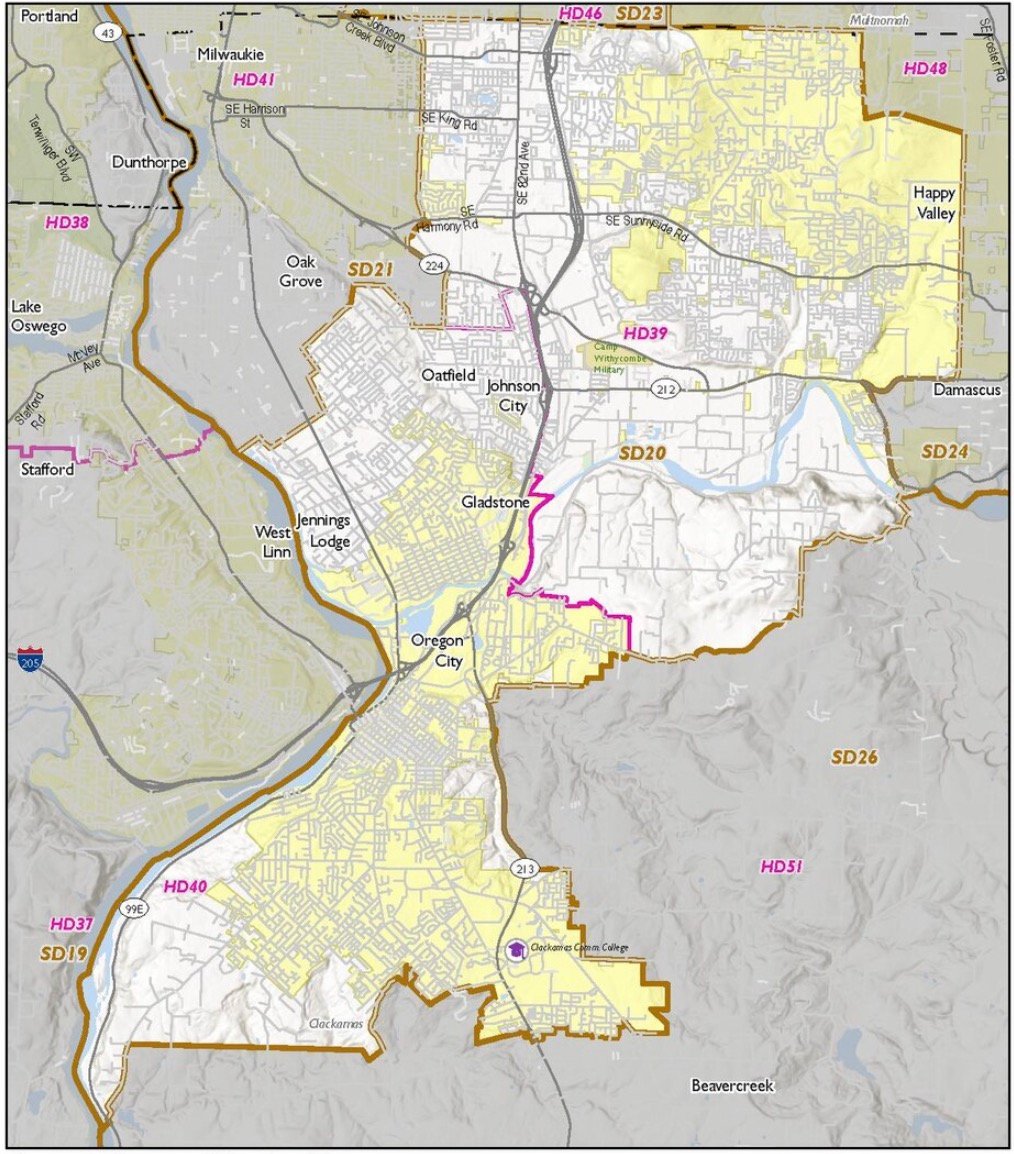Many members of the Oregon Republican occasion are thrilled that transportation funding laws didn’t move this session. And whereas they take credit score for it, the rationale a invoice didn’t move was due to Democrats.
Or to be extra exact, a Democrat. One named Mark Meek, a senator who represents District 20 which incorporates components of east Portland, Joyful Valley, Oregon Metropolis and Gladstone.
Meek’s opposition to Home Invoice 2025 sealed its destiny. The previous pub proprietor and now actual property agent accrued a superpower this session by being the vote that determined whether or not or not Democrats held onto their supermajority. The occasion wanted all 18 of their members within the 30-person Senate to move the invoice. When Senate President Rob Wagner couldn’t get one different Republican “sure” to offset Meek’s “no,” the sport was over.
So why was Meek so against the invoice? I can’t get into his head and I haven’t talked to him instantly, however I’ve tracked down a number of latest feedback in regards to the invoice made in committee which assist make clear his perspective.

Earlier than I get into this, it’s price noting that Meek comes from a really purple district that was held by a Republican for 12 years earlier than he gained the seat. It’s nearly break up in half by Democrats and Republicans. In 2022, even after the district was redrawn for a stronger Democratic benefit, Meek eked out a victory by garnering 50.4% of the vote in comparison with his challenger’s 49.6% — a distinction of simply 503 votes out of 62,131 votes forged.
So with regards to points like taxes and transportation, you’ll be able to see why Meek must play it very secure.
That didn’t cease him from supporting the invoice when it first got here to the Joint Committee on Transportation Reinvestment (JCTR) on June ninth.
Meek, then a member of the committee, opened his remarks by thanking Senator Bruce Starr, a Republican, for his work on the invoice. (Regardless of Republican claims that the method was not bipartisan; Starr, Boshart Davis, and different members of the Republican occasion had been on the desk as Democrats tried to incorporate their concepts right into a remaining package deal.)
“I’ll vote and assist the introduction of this invoice,” Meek stated to his fellow committee members. However his assist was conditioned on, “realizing numerous work needs to be accomplished.”
Already June ninth, it was simply 20 days earlier than the tip of session and whereas Meek acknowledged it was a “quick time period,” he felt the invoice was vital sufficient to get accomplished.
Meek’s concern in regards to the rushed timeframe and the delay in getting the invoice out was shared broadly amongst lawmakers and advocates from throughout the political spectrum and can go down in historical past as one of many major errors of Democratic occasion management. Over two months handed from when Democrats first revealed an official funding framework in April to when HB 2025 turned public round June ninth. In that interim interval, impatience grew a lot that members of the Democrat and Republican events bothunveiled payments of their very own (that may later turn into amendments to the official invoice).
Getting again to Meek, he was sanguine in regards to the invoice’s prospects on June ninth.
“I might name this the, , the inspiration, the start line,” he stated at that first committee assembly. “Let’s let’s have some actually good conversations, and let’s preserve our choices open, as a result of I feel Oregonians are in search of us to to actually move an acceptable transportation package deal that can each be accountable, palatable and efficient with our transportation system proper now, on all ranges. I’m simply hoping that all of us preserve an open thoughts, and we’re all capable of actually hear to one another and collaborate and are available to what I might say is a correct answer for all of us.”
I hope to sometime ask Meek what precisely his “correct answer for all of us” could be; however for now let’s see what else he stated about it through the session.
Someday later, on June tenth, there was one other committee listening to on the invoice. This was the place we get the primary trace that Meek may be pissed off on the rushed timeline for the invoice. At one level he requested, “How a lot income is that this invoice producing on the whole?” To which he was informed by somebody from the Legislative Fiscal Workplace that these numbers had been nonetheless being crunched and wouldn’t be obtainable for 2 extra days.
I’m unsure if or how a lot this reply bothered Meek, however different members of the committee had been moderately aggravated {that a} invoice was having public hearings earlier than fundamental monetary particulars had been labored out.
“I’m stunned that we’re not getting any greenback quantities till Thursday, which is after a lot of the public hearings,” stated Home Rep and committee Vice-Chair Shelly Boshart Davis that Tuesday. “I feel that’s a bit irresponsible for the general public to weigh in once we don’t know what sort of income is being raised.”
(One possible motive the quantity crunching took so lengthy this yr is as a result of lawmakers had been wrestling with a particularly difficult set of value tables as a part of their revamp of the Freeway Price Allocation Examine (HCAS), an annual report that calculates what various kinds of automobiles pay to make use of the roads.)
The subsequent we heard from Meek was one week later. By that point, the fiscal evaluation had been accomplished, however lawmakers’ heads had been spinning as they tried to maintain monitor of 18 completely different amendments that had been filed.
In his remarks on the June seventeenth committee assembly, Meek’s tone had modified. “On the danger of being important, I’m going to be important,” is how he kicked off an trade with JCTR Co-Chair Sen. Chris Gorsek:
Meek:
“I don’t see how anyone can count on us to vote on this tomorrow or the day after primarily based on all the things that was offered,” Meek stated, “and the time we now have to digest this and even to amend it or right it and ensure it’s carrying out what we’re taking a look at.
I’m pissed off to the best degree, and you may count on a no vote out of me proper now.”
Gorsek:
“You realize that in instances like this, there are going to be issues getting info from LRO [Legislative Revenue Office] and LFO [Legislative Fiscal Office]. This isn’t an uncommon circumstance, and issues are nonetheless coming collectively. That’s not our alternative, however it’s what’s been occurring, and so we’ve been delayed, and we now have offered what we now have at the moment. However I hope you gained’t rush to judgment on this and that you’ll give it an opportunity, as a result of there’s nonetheless much more info to come back out.”
Meek:
“Co-Chair Gorsek, are you able to perceive the train that we’re going by? We’re scheduled for an informational assembly on this and we barely get it an hour in the past or so. We’re all very busy at the moment. After which we search for numbers. We’re imagined to be digesting numbers. We requested for numbers final week. We lastly obtained them on Thursday or early Friday.
Co-Chairs Gorsek and McLain, I don’t I don’t blame you, however we began this train June ninth, and attempting to hurry this not a very good apply.”
Gorsek:
“And let me say I completely perceive what you’re saying. We too have been very pissed off with how sluggish the data has been coming to us and and I don’t blame you a bit for being pissed off. We’re pissed off as nicely, however I hear what you’re saying.”
Three days after this trade the place Meek expressed his intent to vote towards the invoice, he was faraway from the committee.
On June twentieth, Meek was seated on the dais of the committee as a non-voting member and he obtained one final probability to talk his thoughts.
Meek acknowledged that his opposition was to the method, which he felt was rushed. When he started to share a private expertise to flesh this out, I perked up. He then spent a number of minutes recounting a narrative about being a small enterprise proprietor within the Nineties and the way he tried to redevelop a theater in southeast Portland right into a tavern venue referred to as the Mt. Tabor Pub.
“It took me months to undergo the method,” Meek recalled. He defined how he needed to get buy-in from neighborhood associations, then get metropolis permits, and cope with the Oregon Liquor Management Fee (OLCC) to get a brand new license. By way of all of it, he encountered obstacles. “They wished me to place in a fireplace suppression system. I didn’t have cash for a fireplace suppression system, so I found out a method to navigate and overcome that subject… Then I had bother operating my coolers… and I needed to get a rotor hammer and lower four-inch concrete in half to get the glycol system to function and supply beer all the way down to the servers,” he continued.
It was “hurdle after hurdle after hurdle” and “misstep after misstep after misstep,” Meek shared. However he persevered. “I obtained it opened, solely to be a failed enterprise,” Meek stated.
The relevance of this comparability was considerably misplaced on me, however Meek stated he’s seen an analogous “misstep after misstep” with how the method behind HB 2025 had gone.
“The [bill] language is inaccurate; we’re attending to technical fixes; we now have info coming to us late; our committee was scheduled for two:30 and we begin till 4:00 or so,” Meek stated, itemizing a few of his frustrations.
After which we obtained to the center of his opposition:
“I’ve to simply absolutely state that this package deal is essentially flawed for a lot of causes. One of many causes is that it’s not reasonably priced to Oregonians. We face dire, and I do need to say dire, financial instances. We’re coping with inflation. Can’t afford to feed your households as a result of milk’s excessive. The price of eggs are excessive. Households are actually, actually struggling…
The world has modified over the past two, three years, and but we’re going to have a look at this new tax answer? I’m the primary to face up right here and inform you proper now that I’m able to vote on a tax enhance this yr to assist make ODOT complete, to do the work that ODOT wants and our Oregonians wish to see in filling potholes, fixing bridges, all the relaxation. However this isn’t the answer at the moment.
I agree there’s some nice programming on this invoice, however I simply can’t assist it. And what I’m pissed off by is that, my lesson I discovered in my life is to take a step again from that mistake I made, and it’s by no means too late to do the correct factor.
Now we have little or no time. I’m completely satisfied to work the following 48 hours, 72 hours straight, to get collectively and work out a finest method to resolve this subject for Oregonians. However that’s not the case. I used to be faraway from this committee, so I’m going to be a ‘no’. I shall be a ‘no’ on the Senate flooring of that is the model that comes throughout…
I actually, actually wish to assist this physique doing a correct answer to assist Oregonians, and I simply can’t assist this invoice.”
And that was that. Not solely did Meek stay a ‘no,’ however six days later he went rogue. He unfold disinformation in regards to the invoice on social media, saying it might begin a tolling program when that was simply disprovable info.
Did Dems break their possibilities at persuading him by booting him off the committee? Was his “no” vote a case of bitter grapes? Was Meek merely unable to assist such a big tax package deal as a purple district senator?
Solely Meek is aware of how he got here to his choice. And because the mud settles on this historic debacle, he possible is aware of how consequential it was to the way forward for transportation in Oregon.
































